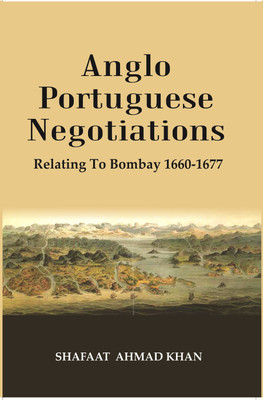Anglo Portuguese Negotiations : Relating To Bombay 1660-1677(Paperback, Shafaat Ahmad Khan)
Quick Overview
Product Price Comparison
About The Book : Bombay possesses a singular power of arousing the interests of its citizens in its chequered annals, and a band of distinguished historians has carried on the pious task of recording its phenomenal growth in a series of luminous monographs and comprehensive gazetteers. Campbell has compiled an admirable collection of representative data in the Bombay Gazetteer Materials, Edwardes has given a masterly sketch of the rise of Bombay. These are our principal authorities for the study of the history of Bombay; and it would be difficult to find a better collection of essential data. There is, however, one aspect of the history of Bombay which seems to me to have been ignored by its historians. They have neglected to emphasize the importance of the Anglo-Portuguese negotiations, and have contented themselves hitherto with a brief account of the unfortunate squabbles between the Portuguese Viceroy and the English Commanders. A deeper study of the data reveals the existence of a continuous. Another important feature of these negotiations is their wealth of information on the commercial usages of the period. For it was not merely a question of petty dues and vexatious tolls; it was the vital problem of the security of the Company's trade, and the safety of its subjects. There was another important aspect of this quarrel. The elaborate reports of the Council, the active support of the King, and the numerous representations to the Portuguese Government, show the intimate connection between the foreign and the economic policy of England, while the keen and sustained interest manifested by Charles II in the varied colonial and commercial activities of the times vindicate that monarch from the reckless charges hurled by his opponents. About The Author : Sir Shafaat Ahmad Khan (1893-1947), an eminent historian of pre-independence India, became the Chairman of the Modern Indian History Department, at the University of Allahabad, in 1921. He began the Journal of Indian History under the aegis of the department in 1924. He also taught at the University of Madras and the Aligarh Muslim University and presided over the first all India modern history Congress, which was to become the Indian history Congress in 1935. Sir Shafaat had also been a member of the UP Legislative Council part of the Muslim delegation to the Round Table Conference and IndiaŌĆÖs high commissioner to South Africa from 1941 to 1944. He was also a member of the 14 member interim cabinet, formed in 1946 to facilitate the transfer of power from the British to the Indians. He is the author of various significant historical works, including John Marshall in India Notes and Observations in Bengal (1668-1672), Anglo Portuguese negotiations relating to Bombay (1660-1677), Sources for the History of British India in the Seventeenth Century and The East India Trade in the Seventeenth Century.


